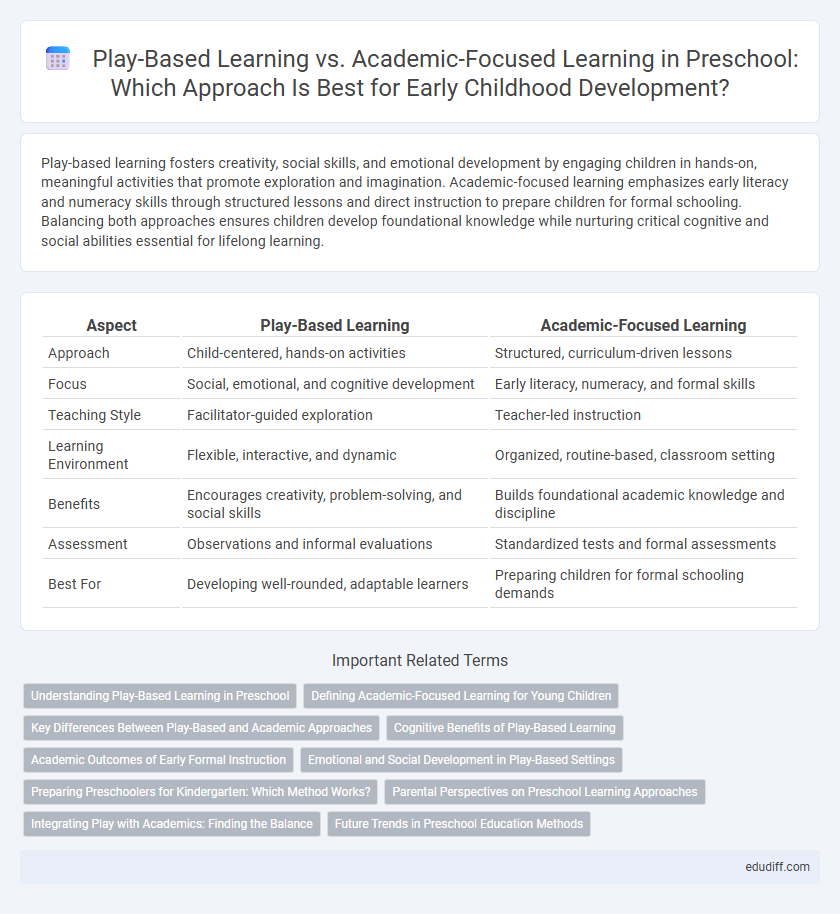Play-based learning fosters creativity, social skills, and emotional development by engaging children in hands-on, meaningful activities that promote exploration and imagination. Academic-focused learning emphasizes early literacy and numeracy skills through structured lessons and direct instruction to prepare children for formal schooling. Balancing both approaches ensures children develop foundational knowledge while nurturing critical cognitive and social abilities essential for lifelong learning.
Table of Comparison
| Aspect | Play-Based Learning | Academic-Focused Learning |
|---|---|---|
| Approach | Child-centered, hands-on activities | Structured, curriculum-driven lessons |
| Focus | Social, emotional, and cognitive development | Early literacy, numeracy, and formal skills |
| Teaching Style | Facilitator-guided exploration | Teacher-led instruction |
| Learning Environment | Flexible, interactive, and dynamic | Organized, routine-based, classroom setting |
| Benefits | Encourages creativity, problem-solving, and social skills | Builds foundational academic knowledge and discipline |
| Assessment | Observations and informal evaluations | Standardized tests and formal assessments |
| Best For | Developing well-rounded, adaptable learners | Preparing children for formal schooling demands |
Understanding Play-Based Learning in Preschool
Play-based learning in preschool fosters cognitive, social, and emotional development through interactive and imaginative activities tailored to young children's natural curiosity. This approach emphasizes hands-on experiences and peer collaboration, which enhance problem-solving skills and creativity more effectively than structured academic drills. Research indicates that children engaged in play-based environments demonstrate stronger language acquisition and better long-term academic outcomes.
Defining Academic-Focused Learning for Young Children
Academic-focused learning for young children emphasizes structured instruction in foundational subjects such as literacy, numeracy, and basic sciences, aiming to prepare children for formal education. This approach incorporates specific curricula, assessments, and teacher-led activities designed to develop cognitive skills and knowledge acquisition. It contrasts with play-based learning by prioritizing measurable academic outcomes and early mastery of standard educational benchmarks.
Key Differences Between Play-Based and Academic Approaches
Play-based learning emphasizes child-led activities that foster creativity, social skills, and problem-solving, contrasting with academic-focused learning which prioritizes structured lessons targeting literacy, numeracy, and cognitive development. In play-based settings, exploration and imagination are central, while academic programs often utilize standardized curricula and assessments. The key difference lies in the approach to development: holistic growth through experiential play versus targeted skill acquisition through direct instruction.
Cognitive Benefits of Play-Based Learning
Play-based learning enhances cognitive development by fostering creativity, problem-solving skills, and executive function in preschool children. Engaging in imaginative play stimulates neural connections that support memory, attention, and language acquisition more effectively than rigid academic-focused approaches. These cognitive benefits promote lifelong learning readiness and adaptive thinking abilities essential for early childhood success.
Academic Outcomes of Early Formal Instruction
Early formal instruction in preschool settings often leads to improved academic outcomes, including enhanced literacy and numeracy skills, compared to play-based learning alone. Studies indicate that children exposed to structured academic activities demonstrate higher readiness for elementary education and standardized test performance. This approach emphasizes skill acquisition and cognitive development through systematic teaching methods.
Emotional and Social Development in Play-Based Settings
Play-based learning in preschool prioritizes emotional and social development by encouraging collaboration, empathy, and self-regulation through interactive activities and imaginative play. This approach fosters stronger interpersonal skills and emotional resilience compared to academic-focused learning, which often emphasizes structured tasks and cognitive achievements. Research indicates children in play-based settings exhibit higher emotional intelligence and social competence vital for long-term developmental success.
Preparing Preschoolers for Kindergarten: Which Method Works?
Play-based learning enhances social, emotional, and cognitive development by fostering creativity and problem-solving skills essential for kindergarten success. Academic-focused learning emphasizes early literacy and numeracy, aiming to build foundational knowledge and structured discipline in young learners. Research supports a balanced approach, integrating play with academic concepts to effectively prepare preschoolers for the diverse demands of kindergarten.
Parental Perspectives on Preschool Learning Approaches
Parental perspectives on preschool learning approaches often reveal a preference for play-based learning, valuing its role in fostering social, emotional, and cognitive development through hands-on experiences. Many parents associate academic-focused learning with early literacy and numeracy skills but express concerns about potential pressure and reduced creativity. Studies indicate a growing trend toward integrated curricula that balance structured academics with play to support holistic child development and parental satisfaction.
Integrating Play with Academics: Finding the Balance
Integrating play with academics in preschool settings enhances cognitive development by combining hands-on exploration with foundational literacy and numeracy skills. Play-based learning fosters creativity, social skills, and problem-solving, while academic-focused activities build early reading, writing, and math competencies critical for school readiness. Striking a balance between these approaches supports holistic growth, ensuring children remain engaged and motivated while acquiring essential knowledge and skills.
Future Trends in Preschool Education Methods
Future trends in preschool education emphasize a balanced integration of play-based learning and academic-focused approaches, fostering holistic development. Research indicates that incorporating structured play with targeted academic skills enhances cognitive, social, and emotional growth in early childhood. Emerging technologies and personalized learning platforms will further support adaptive, child-centered curricula, preparing students for dynamic future learning environments.
Play-based learning vs Academic-focused learning Infographic

 edudiff.com
edudiff.com